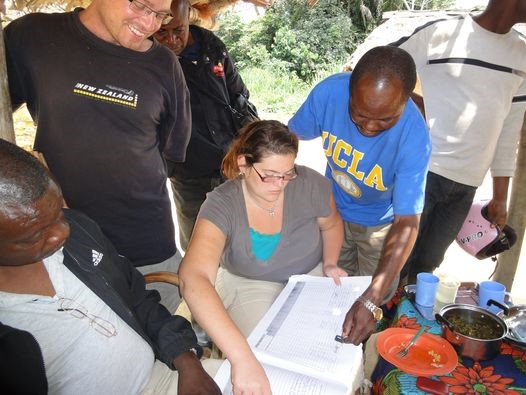Nicole A. Hoff '07

Dr. Nicole A. Hoff '07
Infectious disease epidemiologist and adjunct professor, UCLA Fielding School of Public Health; Kinshasa, the Democratic Republic of the Congo
Graduation Year
2007
Knowing what you do, and where you are, how has your work focus and environment changed since this pandemic took hold of our planet. What sort of provisions are being made in the Congo to keep covid-19 from spreading?
Since the 1st case in DRC in mid-March, they have had progressive changes to what is open (all bars and restaurants closed), just essential businesses open, to confining certain parts of the city where they have seen the most cases - this means putting up blockades to all entrances to this part of town. To enter and exit, you have to have a pass, and you wash your hands and have your temperature taken. This week, this ban will lift within the area, but still restrict movement in and out of the area and now everyone is required to also wear a mask. There are a lot of challenges here -due to the poverty level and fragile health care system. Most people live on less than a dollar a day - so moving to completely shutting the city down has been near impossible. Each week seems to bring more information from other countries who are further ahead of us, and hopefully the country will keep the number of cases low - right now there are 350 confirmed cases.
Are you actively working to develop a vaccine for the corona virus?
Our team does not do vaccine development, but we work with a number of collaborators who use our samples from specific types of populations (survivors from previous Ebola outbreaks, people with interesting antibodies profiles) to see if there are elements which could be used for improved therapeutics and vaccines. Our team looks more closely at immunological and epidemiological profiles of specific populations.
What advice would you have for a Hood student interested in epidemiology?
When I was looking for what to do after graduating Hood, I wanted something that combined my biology and sociology degree. The awesome thing about public health - is there are so many different backgrounds coming into this field now. That you don't just have to have one skill, but really all skills across a diverse background are coming together. This is becoming an even greater field. And now with COVID-19, more people will know what epidemiologist do - and that we are not "skin doctors."
Were you aware that we’ll be one of the only schools in Maryland to offer an undergraduate program in Public Health? If this had been offered when you were here at Hood, would it have made a difference in your major, or career path?
I took part in some the really early discussions a few years ago. I am really excited about this program! Maybe one day will get to lecture for one of the courses! I probably would have gone that direction, I ended up getting two majors in biology and sociology - which has been the perfect combination for being effective in my current position. To know the biological mechanisms of disease and how they affect large populations.
What does your work day look like?
Before the outbreak, our office at the National Institute of Biomedical Research had 15-18 people working on various projects either in the lab or epi related. Since the outbreak, we have moved most of the staff to working from home. Much of our work includes being in the field - which we can't do right now. So instead teams are preparing for trips as much as possible so that we have minimal delays. Our lab team - because of the samples and equipment - they have a rotation to ensure that we do not have any issues in the lab.
Anything else you’d like to say about your current work and how Hood prepared you for your career?
I had some pretty amazing mentors in both the Biology and Sociology department. I appreciated the small class sizes and chance to really have mentors. I still keep in contact with many of them today!"
Are you ready to say Hello?
Choose a Pathway
Information will vary based on program level. Select a path to find the information you're looking for!
